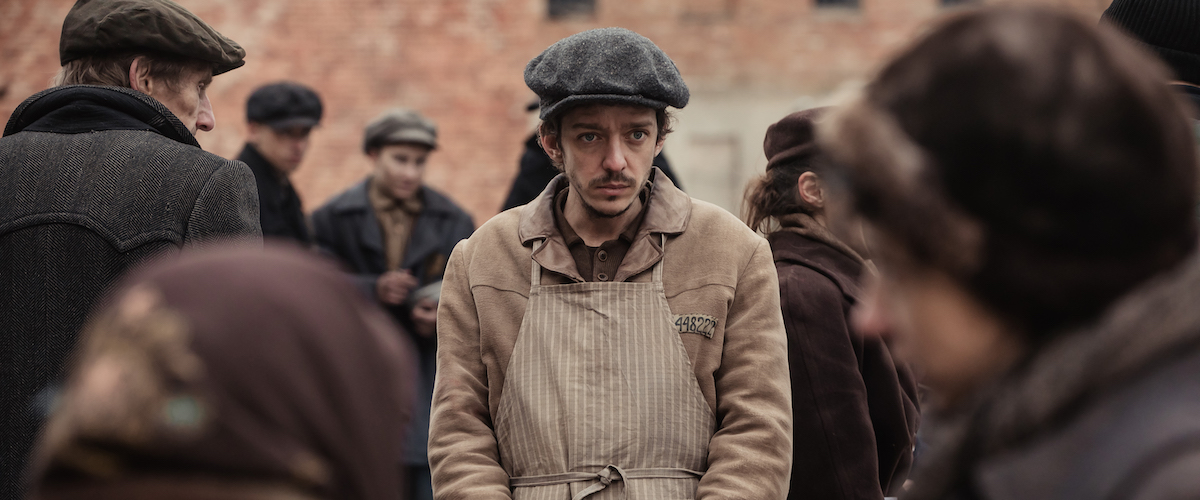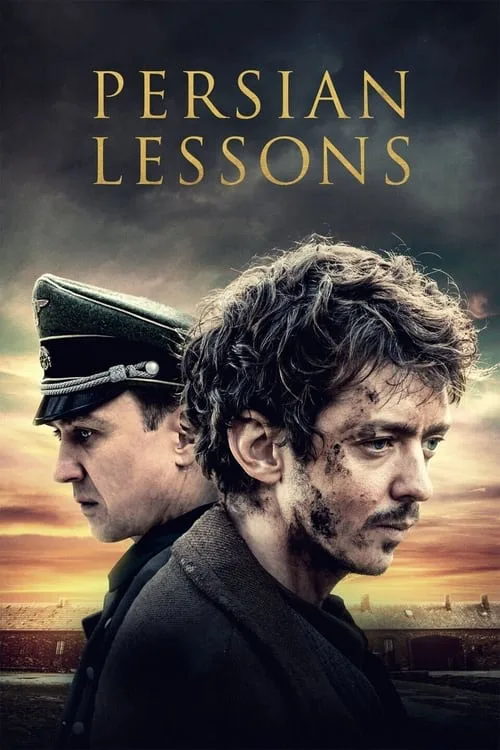Although Vadim Perelman’s “Persian Lessons” is credited as an adaptation of the short story Erfindung Einer Sprache by Wolfgang Kohlhaase, the film begins with titles that read “Inspired by true events,” a nod to the film’s Holocaust setting. Though millions of Jewish people were imprisoned and killed in concentration camps during this time, this misguided drama, written by Ilya Tsofin, isn’t interested in the truth of their stories. Instead, it’s a contrived triumph-of-the-human-spirit narrative where the Jewish character at the center is rendered a cipher for suffering while his Nazi tormentors are unconsciously humanized.
We’re introduced to Gilles (Nahuel Pérez Biscayart), a Jewish man from Antwerp, after he’s been captured in France by the German Army. While being transported in a cramped truck to a concentration camp, he trades half a sandwich with a fellow passenger for a rare book of Persian tales. It’s unclear what he would get out of this trade. That is, until he later uses the book to evade a death squad by claiming he is actually Persian, not Jewish.
This is the first of many contrived coincidences, followed immediately by another when the soldiers spare his life—after unceremoniously murdering all his fellow passengers—because their deputy commandant Koch (Lars Eidinger) has been looking for someone to teach him Farsi. Now answering to the name Reza, to whom the book had been inscribed, Gilles must work in the camp’s kitchens during the day and teach Koch Farsi at night, despite not knowing a lick of the language. In a move seemingly crafted solely for the big emotional payoff at the end of the film, Gilles/Reza uses the names in the camp’s ledger as a mnemonic device to create the 2,000 vocabulary words Koch hopes to learn so he can move to Tehran after the war.
Mining the tension of whether the Nazis will murder a Jewish man or not is already a queasy way into this horrendous period, but that Tsofin’s screenplay does little to flesh out who Gilles/Reza actually is beyond his trauma makes it even more exploitative. The filmmakers then double down on their wrongheaded choices by not only attempting to humanize Koch, the Nazi, through this new teacher-student relationship—one whose power dynamics are barely explored—but also by spending more time with two scheming and jealous Nazis named Max (Jonas Nay) and Elsa (Leonie Benesch), who resent Gilles/Reza’s place in the camp.
If you ever wanted a movie with a Nazi love triangle, a Nazi dance, Nazi gay panic, and jokes about the size of a Nazi commander’s dick, this is the movie for you. What’s worse is that this attempt at workplace drama doesn’t even give insight into the horrendous acts these characters perpetuate. In fact, at times, it almost seems to want to engender them to the audience. The jolts of humor that the many scenes with these characters bring to the film are completely out of place in this otherwise overly bleak production.
Also, through their conversations, we learn more about the lives and desires of these Nazis than we ever do of Gilles/Reza. Who is he outside this present trauma? Who was he before the war? “Persian Lessons” is a showcase for Biscayart’s polyglot abilities, but the narrative never bothers to explain why Gilles/Reza speaks multiple languages, nor how he can seemingly make up this brand new fake Farsi language.
Eventually, the film deigns to introduce a few more Jewish characters, two brothers from Italy, only to use them as emotional fodder to further torture Gilles/Reza. Late in the movie, when he chooses to sacrifice his freedom for one of them, Koch asks him why he would trade his life for one of these nameless people. Gilles/Reza replies, “They’re only nameless because you don’t know their names.”
This moment is engineered to make an emotional impact on the audience. But it’s dulled completely as this shallow film can only seem to define the humanity of Gilles/Reza—and his fellow Jews—through their trauma and nothing more, while somehow giving more grace and texture to their tormentors.
Biscayart does a lot of heavy lifting with his deeply felt performance, despite the lack of depth his character is afforded. His expressive, soulful eyes transmit more nuanced, truthful emotions than any of the film’s hackneyed dialogue. It is truly a testament to his talent that the film’s final moments, in which his mnemonic device plays a pivotal role, find any truth. “Persian Lessons” ends on yet another overly engineered scene, in which the names of thousands of dead are used to evoke a harrowing sadness, when the film never bothered to let us know them when they were alive.
Now playing in theaters.




















